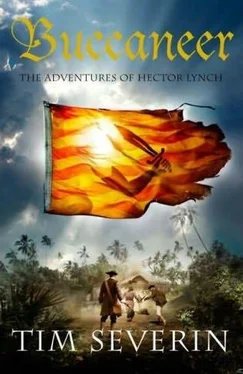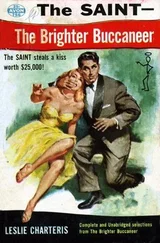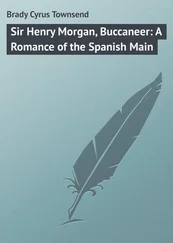Watling's rabble slowly advanced. Occasionally a man would halt and double over, vomiting in the road. Others stumbled and tripped. One fell flat on his face in the dust before he was pulled back to his feet by a comrade. Soon the gaggle of drunken looters were level with the gully where the Spaniards waited in ambush, and for one alarming moment Hector saw a buccaneer break away from the group and run to the side of the road. If he stumbled into the ambush, a massacre would follow. The man was clawing at his breeches as he ran, and he must have been caught short, for before he reached the roadside, he suddenly squatted and defecated in the dust. Gorged on too much fresh fruit from the gardens of La Serena, Hector thought grimly, as the man pulled up his breeches and broke into a weaving run to rejoin the column.
'Canoes ready on the beach,' Jacques called up from the foot of the tower. At last some of Watling's men had noticed the row of figures standing on the parapet. Faces turned up as the returning buccaneers began to wonder what was happening. Others were pointing, and Jezreel and the rearguard could be seen bringing their muskets to the ready. Hector stepped forward, hoping that he would be recognised, and waved at them, urging them to hurry down the final slope to the waiting canoes.
'Don't move!' Hector snapped at his hostages. 'We stay here until everyone is safe back to the ship.'
One of the Spaniards shifted on his feet and asked mockingly, 'And what about you, how will you leave?'
Hector did not answer. Watling's party were sliding and stumbling down the slope towards the beach. He could hear the crunch and clatter of the shingle beneath their feet and, amazingly, a snatch of drunken song. Some of the buccaneers still did not understand the danger they were in. From his vantage point Hector saw Jacques emerge from the base of the tower below him and run forward and speak urgently to Jezreel. Watling was beside him. A sense of urgency finally spread through the entire group. Some of them turned to face inland, reaching for their muskets.
Hector looked towards the ridge at the top of the beach. Now it was lined with dozens of Spanish soldiers. More and more armed men were appearing out of ravines and dips in the ground, or pushing out from the bushes. There must have been at least four companies of soldiers, and they were well disciplined and trained for they took up their positions in orderly formation, looking down on the buccaneers as they splashed out into the shallows and began loading their booty into the canoes. If anything went wrong now, the beach would become a killing ground.
A sudden flurry of movement, and Hector saw Jezreel reach out and wrest a gun away from a drunken buccaneer. He must have been preparing to fire a shot in bravado.
The loaded canoes began leaving the beach, heading towards Trinity. Only the smallest one was left, and Jezreel was standing up to his knees in the water holding the bow steady, waiting for him.
From below, a group of men came into view. They were the Spaniards whom Jacques had been holding captive. They were running towards the militiamen at the top of the slope. As they ran they were gesticulating and shouting out that they were Spanish, calling on the soldiers not to shoot. Now the only remaining prisoners were the half dozen men with Hector on the roof of the tower.
He went over the row of hostages, and raised the nooses from their necks. He crossed to the ladder which led down from the roof and began to climb down the rungs. As his head came level with the flat roof, he took out his knife and cut the cords which bound the ladder in place. Reaching the foot of the ladder, he pulled it clear. It would take several minutes for the prisoners to free themselves and still they would be trapped in the tower.
Continuing down the ladders, Hector removed each one as he descended. Reaching the ground, he walked out of the door and onto the beach. He was alone. To his right Jezreel waited with the canoe. To his left, no more than fifty paces away, stood the line of Spanish soldiers. They had advanced down the slope in open formation, muskets ready. Hector remembered how he had gone forward under the white flag of truce to the palisade of Santa Maria. But this time he had no white flag, only his faith in Peralta.
Someone stepped out from the Spanish line. It was Peralta himself. He came down the slope of beach, unarmed, his face sad.
'Your people have gutted La Serena,' he said. 'But I am grateful to you for making sure that my colleagues and I were released unharmed.' Behind him, Hector heard Jacques shouting that Trinity was weighing anchor and they must leave now if they were to reach the ship in time. Peralta stared into his eyes and his gaze was Unflinching.
'You may tell your captain that the next time he tries to raid us, he and his men will not be so lucky. Now go.'
Hector did not know how to answer. For a moment he stood where he was, conscious of the hostility of the Spanish soldiers fingering their guns and Peralta's flinty tone. Then he turned, walked down the beach and climbed into the waiting canoe.
THIRTEEN
Hector had grown accustomed to the constant moaning and braying, barking and hissing, bubbling and trumpeting. The clamour had been in the background from the day Trinity arrived at the island exactly two weeks after the withdrawal from La Serena. The hubbub came from hundreds upon hundreds of large furry seals which lounged and fought and squabbled on the rocks. There were so many of the creatures and they were so sure of their possession that when the sailors first landed, the men had to force their way through the ranks of fishy-smelling beasts, clubbing them aside. The largest of the bull seals, gross lords and terrors of their harems, had resented the intrusion. They rushed furiously at the strangers, silver manes swollen, long yellow fangs bared, grunting and roaring hoarsely until the seamen fired pistols down their angry pink throats. The dark, almost black seal meat had been welcome at first, but the men soon tired of the taste. Now, if a seal was killed, the carcass was left to rot.
Sharpe had brought Trinity to Juan Fernandez at the crew's angry insistence. After the disappointment of La Serena the men had voted to spend Christmas there, far from the constant threat of vengeful Spanish cruisers. Hector wondered how sailors had known about the remote, mountainous island. Juan Fernandez lay 400 miles from the South American coast, and the South Sea was an uncharted mystery to all but the Spaniards. Yet there were men aboard Trinity who were aware that this bleak, unfrequented place offered a refuge. He supposed that somehow in the taverns of European ports and Caribbean harbours where sailors gathered, men talked of the island and how they had been able to recruit their strength there, repair their vessels, and relax.
When Trinity arrived on a grey, windswept day in early December the island was uninhabited. But it was obvious that people had visited Juan Fernandez because someone had stocked the place with goats. The animals had thrived and wild herds of them roamed the broken scrub-covered uplands. Their flesh was much to be preferred to seal meat, so Dan and the other remaining striker, another Miskito named Will, went off daily with their muskets and came back with goat carcasses draped over their shoulders. However, it was Jacques who had provided the most certain proof that other sailors had used the island as a resting place. Shortly after landing, he had come hurrying back, beaming with pleasure and brandishing a handful of various leaves and plants. 'Herbs and vegetables!' he crowed. 'Someone planted a garden here and left it behind to grow! Look! Turnips, salads, green stuff!'
The crew of Trinity had quickly made themselves comfortable. They draped spare sails over the branches of trees to make tents, set up frames on which they barbecued goat meat and fish, filled their water jars at the stream which emptied across a beach of small boulders and into the bay. On Christmas Day itself Jacques had cooked the entire company a great dish of lobsters, broiling them over the fire. He insisted on calling them langoustes, and they crawled in the shallows of the bay in such numbers that one had only to wade out into the chilly water and gather them by hand, dozens at a time. For their vegetable the company had eaten finely sliced strips of tree cabbage cut from the tender head of sprouting palms.
Читать дальше








